Ethical Issues and Problems in Business
VerifiedAdded on 2022/02/04
|10
|4103
|23
AI Summary
Business is a productive human activity that brings beneficial contribution to both people and society. Business produces employment, fair deals, creativity, advancement of technology, customers' satisfaction, among others. . This chapter examines the broad array of ethical issues and problems that affect the flow of business as a dynamic yet complex human activity.
Contribute Materials
Your contribution can guide someone’s learning journey. Share your
documents today.
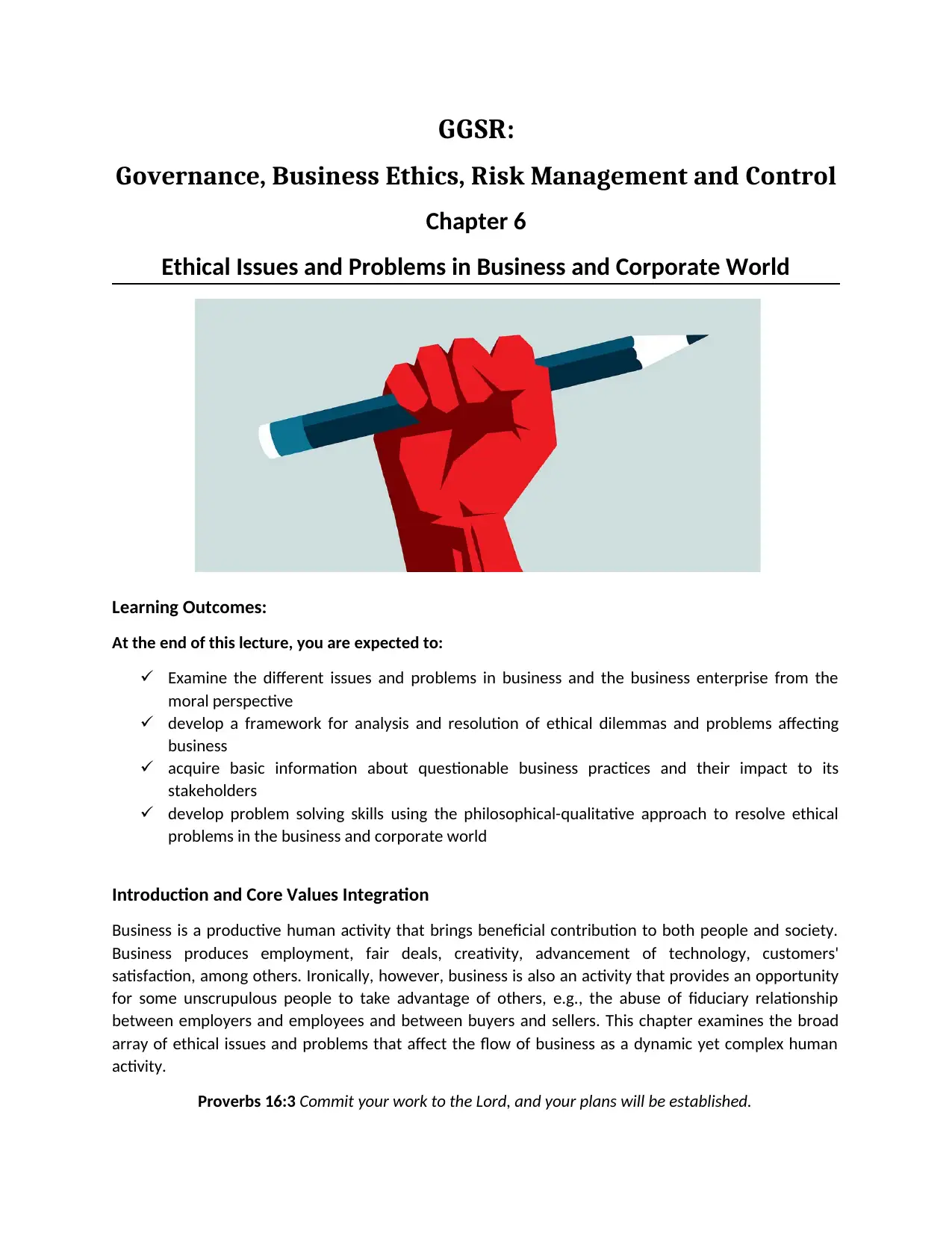
GGSR:
Governance, Business Ethics, Risk Management and Control
Chapter 6
Ethical Issues and Problems in Business and Corporate World
Learning Outcomes:
At the end of this lecture, you are expected to:
Examine the different issues and problems in business and the business enterprise from the
moral perspective
develop a framework for analysis and resolution of ethical dilemmas and problems affecting
business
acquire basic information about questionable business practices and their impact to its
stakeholders
develop problem solving skills using the philosophical-qualitative approach to resolve ethical
problems in the business and corporate world
Introduction and Core Values Integration
Business is a productive human activity that brings beneficial contribution to both people and society.
Business produces employment, fair deals, creativity, advancement of technology, customers'
satisfaction, among others. Ironically, however, business is also an activity that provides an opportunity
for some unscrupulous people to take advantage of others, e.g., the abuse of fiduciary relationship
between employers and employees and between buyers and sellers. This chapter examines the broad
array of ethical issues and problems that affect the flow of business as a dynamic yet complex human
activity.
Proverbs 16:3 Commit your work to the Lord, and your plans will be established.
Governance, Business Ethics, Risk Management and Control
Chapter 6
Ethical Issues and Problems in Business and Corporate World
Learning Outcomes:
At the end of this lecture, you are expected to:
Examine the different issues and problems in business and the business enterprise from the
moral perspective
develop a framework for analysis and resolution of ethical dilemmas and problems affecting
business
acquire basic information about questionable business practices and their impact to its
stakeholders
develop problem solving skills using the philosophical-qualitative approach to resolve ethical
problems in the business and corporate world
Introduction and Core Values Integration
Business is a productive human activity that brings beneficial contribution to both people and society.
Business produces employment, fair deals, creativity, advancement of technology, customers'
satisfaction, among others. Ironically, however, business is also an activity that provides an opportunity
for some unscrupulous people to take advantage of others, e.g., the abuse of fiduciary relationship
between employers and employees and between buyers and sellers. This chapter examines the broad
array of ethical issues and problems that affect the flow of business as a dynamic yet complex human
activity.
Proverbs 16:3 Commit your work to the Lord, and your plans will be established.
Secure Best Marks with AI Grader
Need help grading? Try our AI Grader for instant feedback on your assignments.
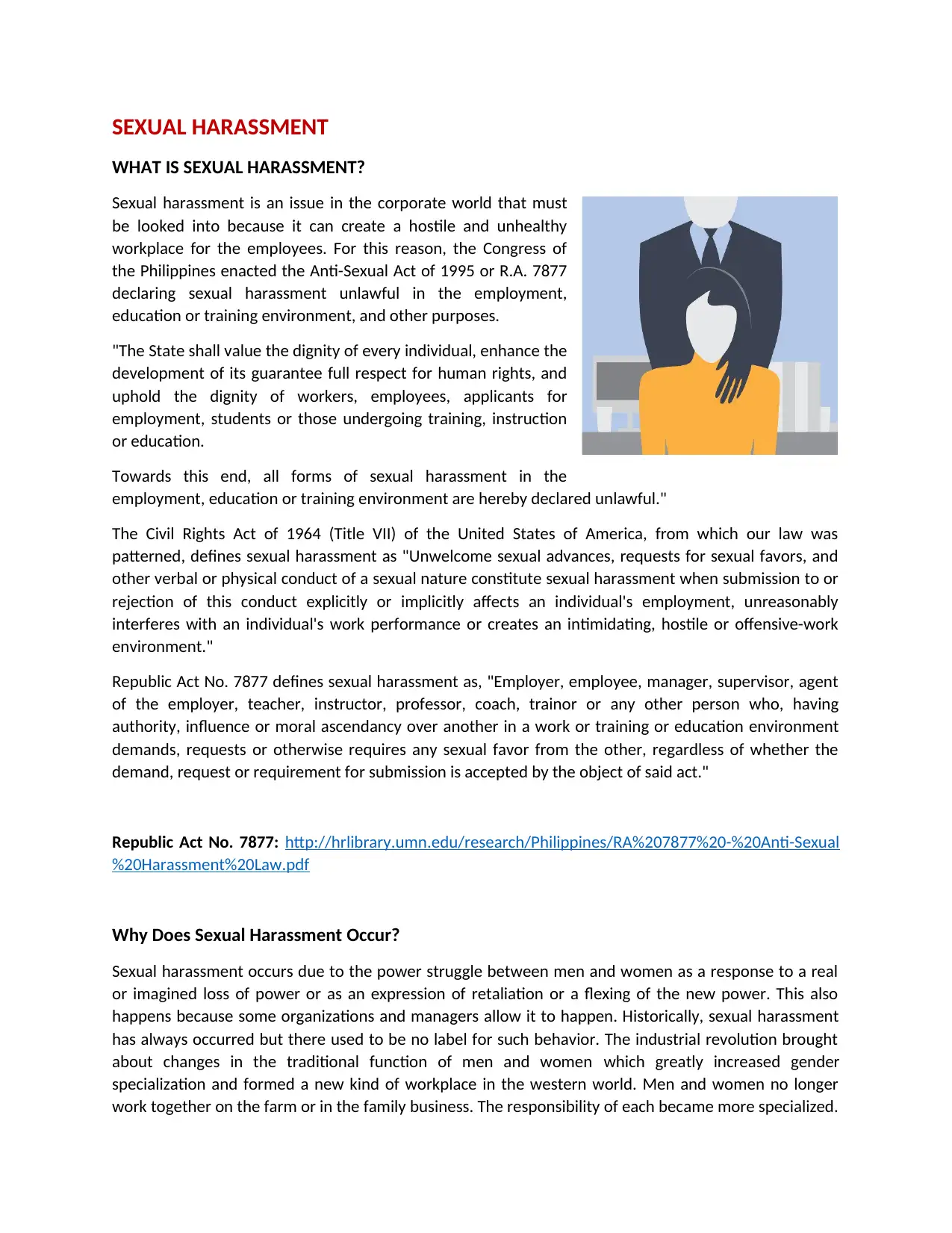
SEXUAL HARASSMENT
WHAT IS SEXUAL HARASSMENT?
Sexual harassment is an issue in the corporate world that must
be looked into because it can create a hostile and unhealthy
workplace for the employees. For this reason, the Congress of
the Philippines enacted the Anti-Sexual Act of 1995 or R.A. 7877
declaring sexual harassment unlawful in the employment,
education or training environment, and other purposes.
"The State shall value the dignity of every individual, enhance the
development of its guarantee full respect for human rights, and
uphold the dignity of workers, employees, applicants for
employment, students or those undergoing training, instruction
or education.
Towards this end, all forms of sexual harassment in the
employment, education or training environment are hereby declared unlawful."
The Civil Rights Act of 1964 (Title VII) of the United States of America, from which our law was
patterned, defines sexual harassment as "Unwelcome sexual advances, requests for sexual favors, and
other verbal or physical conduct of a sexual nature constitute sexual harassment when submission to or
rejection of this conduct explicitly or implicitly affects an individual's employment, unreasonably
interferes with an individual's work performance or creates an intimidating, hostile or offensive-work
environment."
Republic Act No. 7877 defines sexual harassment as, "Employer, employee, manager, supervisor, agent
of the employer, teacher, instructor, professor, coach, trainor or any other person who, having
authority, influence or moral ascendancy over another in a work or training or education environment
demands, requests or otherwise requires any sexual favor from the other, regardless of whether the
demand, request or requirement for submission is accepted by the object of said act."
Republic Act No. 7877: http://hrlibrary.umn.edu/research/Philippines/RA%207877%20-%20Anti-Sexual
%20Harassment%20Law.pdf
Why Does Sexual Harassment Occur?
Sexual harassment occurs due to the power struggle between men and women as a response to a real
or imagined loss of power or as an expression of retaliation or a flexing of the new power. This also
happens because some organizations and managers allow it to happen. Historically, sexual harassment
has always occurred but there used to be no label for such behavior. The industrial revolution brought
about changes in the traditional function of men and women which greatly increased gender
specialization and formed a new kind of workplace in the western world. Men and women no longer
work together on the farm or in the family business. The responsibility of each became more specialized.
WHAT IS SEXUAL HARASSMENT?
Sexual harassment is an issue in the corporate world that must
be looked into because it can create a hostile and unhealthy
workplace for the employees. For this reason, the Congress of
the Philippines enacted the Anti-Sexual Act of 1995 or R.A. 7877
declaring sexual harassment unlawful in the employment,
education or training environment, and other purposes.
"The State shall value the dignity of every individual, enhance the
development of its guarantee full respect for human rights, and
uphold the dignity of workers, employees, applicants for
employment, students or those undergoing training, instruction
or education.
Towards this end, all forms of sexual harassment in the
employment, education or training environment are hereby declared unlawful."
The Civil Rights Act of 1964 (Title VII) of the United States of America, from which our law was
patterned, defines sexual harassment as "Unwelcome sexual advances, requests for sexual favors, and
other verbal or physical conduct of a sexual nature constitute sexual harassment when submission to or
rejection of this conduct explicitly or implicitly affects an individual's employment, unreasonably
interferes with an individual's work performance or creates an intimidating, hostile or offensive-work
environment."
Republic Act No. 7877 defines sexual harassment as, "Employer, employee, manager, supervisor, agent
of the employer, teacher, instructor, professor, coach, trainor or any other person who, having
authority, influence or moral ascendancy over another in a work or training or education environment
demands, requests or otherwise requires any sexual favor from the other, regardless of whether the
demand, request or requirement for submission is accepted by the object of said act."
Republic Act No. 7877: http://hrlibrary.umn.edu/research/Philippines/RA%207877%20-%20Anti-Sexual
%20Harassment%20Law.pdf
Why Does Sexual Harassment Occur?
Sexual harassment occurs due to the power struggle between men and women as a response to a real
or imagined loss of power or as an expression of retaliation or a flexing of the new power. This also
happens because some organizations and managers allow it to happen. Historically, sexual harassment
has always occurred but there used to be no label for such behavior. The industrial revolution brought
about changes in the traditional function of men and women which greatly increased gender
specialization and formed a new kind of workplace in the western world. Men and women no longer
work together on the farm or in the family business. The responsibility of each became more specialized.
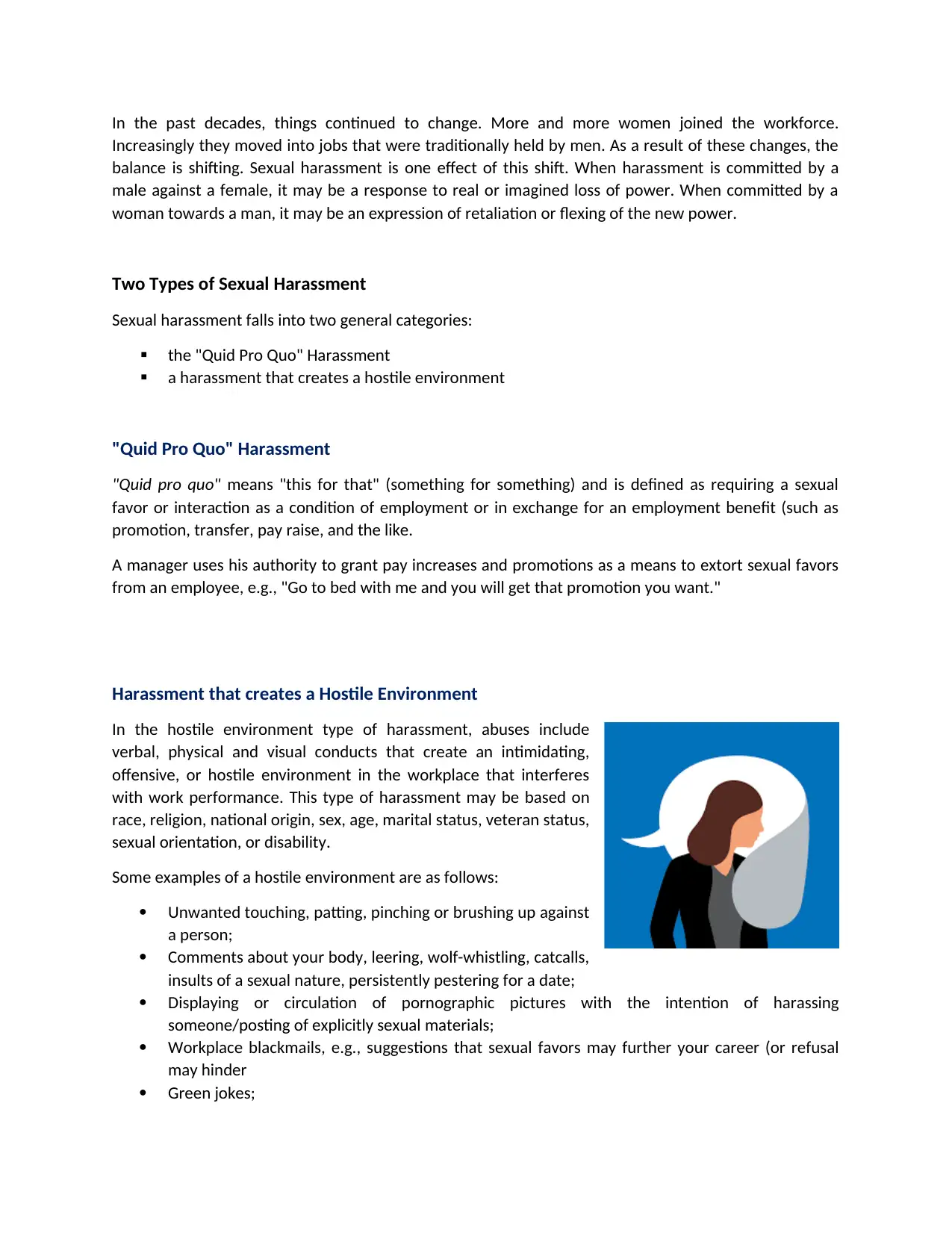
In the past decades, things continued to change. More and more women joined the workforce.
Increasingly they moved into jobs that were traditionally held by men. As a result of these changes, the
balance is shifting. Sexual harassment is one effect of this shift. When harassment is committed by a
male against a female, it may be a response to real or imagined loss of power. When committed by a
woman towards a man, it may be an expression of retaliation or flexing of the new power.
Two Types of Sexual Harassment
Sexual harassment falls into two general categories:
the "Quid Pro Quo" Harassment
a harassment that creates a hostile environment
"Quid Pro Quo" Harassment
"Quid pro quo" means "this for that" (something for something) and is defined as requiring a sexual
favor or interaction as a condition of employment or in exchange for an employment benefit (such as
promotion, transfer, pay raise, and the like.
A manager uses his authority to grant pay increases and promotions as a means to extort sexual favors
from an employee, e.g., "Go to bed with me and you will get that promotion you want."
Harassment that creates a Hostile Environment
In the hostile environment type of harassment, abuses include
verbal, physical and visual conducts that create an intimidating,
offensive, or hostile environment in the workplace that interferes
with work performance. This type of harassment may be based on
race, religion, national origin, sex, age, marital status, veteran status,
sexual orientation, or disability.
Some examples of a hostile environment are as follows:
Unwanted touching, patting, pinching or brushing up against
a person;
Comments about your body, leering, wolf-whistling, catcalls,
insults of a sexual nature, persistently pestering for a date;
Displaying or circulation of pornographic pictures with the intention of harassing
someone/posting of explicitly sexual materials;
Workplace blackmails, e.g., suggestions that sexual favors may further your career (or refusal
may hinder
Green jokes;
Increasingly they moved into jobs that were traditionally held by men. As a result of these changes, the
balance is shifting. Sexual harassment is one effect of this shift. When harassment is committed by a
male against a female, it may be a response to real or imagined loss of power. When committed by a
woman towards a man, it may be an expression of retaliation or flexing of the new power.
Two Types of Sexual Harassment
Sexual harassment falls into two general categories:
the "Quid Pro Quo" Harassment
a harassment that creates a hostile environment
"Quid Pro Quo" Harassment
"Quid pro quo" means "this for that" (something for something) and is defined as requiring a sexual
favor or interaction as a condition of employment or in exchange for an employment benefit (such as
promotion, transfer, pay raise, and the like.
A manager uses his authority to grant pay increases and promotions as a means to extort sexual favors
from an employee, e.g., "Go to bed with me and you will get that promotion you want."
Harassment that creates a Hostile Environment
In the hostile environment type of harassment, abuses include
verbal, physical and visual conducts that create an intimidating,
offensive, or hostile environment in the workplace that interferes
with work performance. This type of harassment may be based on
race, religion, national origin, sex, age, marital status, veteran status,
sexual orientation, or disability.
Some examples of a hostile environment are as follows:
Unwanted touching, patting, pinching or brushing up against
a person;
Comments about your body, leering, wolf-whistling, catcalls,
insults of a sexual nature, persistently pestering for a date;
Displaying or circulation of pornographic pictures with the intention of harassing
someone/posting of explicitly sexual materials;
Workplace blackmails, e.g., suggestions that sexual favors may further your career (or refusal
may hinder
Green jokes;
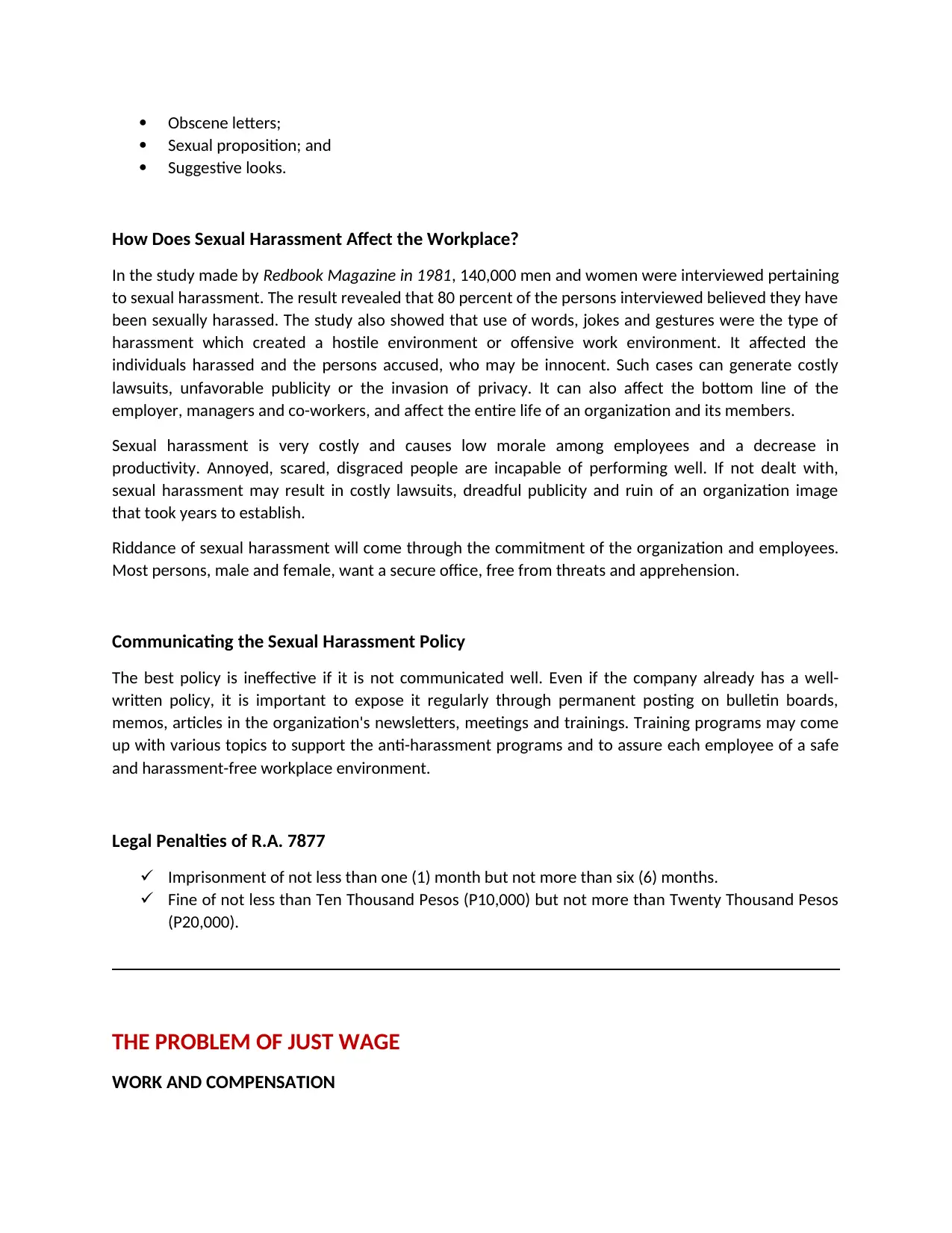
Obscene letters;
Sexual proposition; and
Suggestive looks.
How Does Sexual Harassment Affect the Workplace?
In the study made by Redbook Magazine in 1981, 140,000 men and women were interviewed pertaining
to sexual harassment. The result revealed that 80 percent of the persons interviewed believed they have
been sexually harassed. The study also showed that use of words, jokes and gestures were the type of
harassment which created a hostile environment or offensive work environment. It affected the
individuals harassed and the persons accused, who may be innocent. Such cases can generate costly
lawsuits, unfavorable publicity or the invasion of privacy. It can also affect the bottom line of the
employer, managers and co-workers, and affect the entire life of an organization and its members.
Sexual harassment is very costly and causes low morale among employees and a decrease in
productivity. Annoyed, scared, disgraced people are incapable of performing well. If not dealt with,
sexual harassment may result in costly lawsuits, dreadful publicity and ruin of an organization image
that took years to establish.
Riddance of sexual harassment will come through the commitment of the organization and employees.
Most persons, male and female, want a secure office, free from threats and apprehension.
Communicating the Sexual Harassment Policy
The best policy is ineffective if it is not communicated well. Even if the company already has a well-
written policy, it is important to expose it regularly through permanent posting on bulletin boards,
memos, articles in the organization's newsletters, meetings and trainings. Training programs may come
up with various topics to support the anti-harassment programs and to assure each employee of a safe
and harassment-free workplace environment.
Legal Penalties of R.A. 7877
Imprisonment of not less than one (1) month but not more than six (6) months.
Fine of not less than Ten Thousand Pesos (P10,000) but not more than Twenty Thousand Pesos
(P20,000).
THE PROBLEM OF JUST WAGE
WORK AND COMPENSATION
Sexual proposition; and
Suggestive looks.
How Does Sexual Harassment Affect the Workplace?
In the study made by Redbook Magazine in 1981, 140,000 men and women were interviewed pertaining
to sexual harassment. The result revealed that 80 percent of the persons interviewed believed they have
been sexually harassed. The study also showed that use of words, jokes and gestures were the type of
harassment which created a hostile environment or offensive work environment. It affected the
individuals harassed and the persons accused, who may be innocent. Such cases can generate costly
lawsuits, unfavorable publicity or the invasion of privacy. It can also affect the bottom line of the
employer, managers and co-workers, and affect the entire life of an organization and its members.
Sexual harassment is very costly and causes low morale among employees and a decrease in
productivity. Annoyed, scared, disgraced people are incapable of performing well. If not dealt with,
sexual harassment may result in costly lawsuits, dreadful publicity and ruin of an organization image
that took years to establish.
Riddance of sexual harassment will come through the commitment of the organization and employees.
Most persons, male and female, want a secure office, free from threats and apprehension.
Communicating the Sexual Harassment Policy
The best policy is ineffective if it is not communicated well. Even if the company already has a well-
written policy, it is important to expose it regularly through permanent posting on bulletin boards,
memos, articles in the organization's newsletters, meetings and trainings. Training programs may come
up with various topics to support the anti-harassment programs and to assure each employee of a safe
and harassment-free workplace environment.
Legal Penalties of R.A. 7877
Imprisonment of not less than one (1) month but not more than six (6) months.
Fine of not less than Ten Thousand Pesos (P10,000) but not more than Twenty Thousand Pesos
(P20,000).
THE PROBLEM OF JUST WAGE
WORK AND COMPENSATION
Secure Best Marks with AI Grader
Need help grading? Try our AI Grader for instant feedback on your assignments.
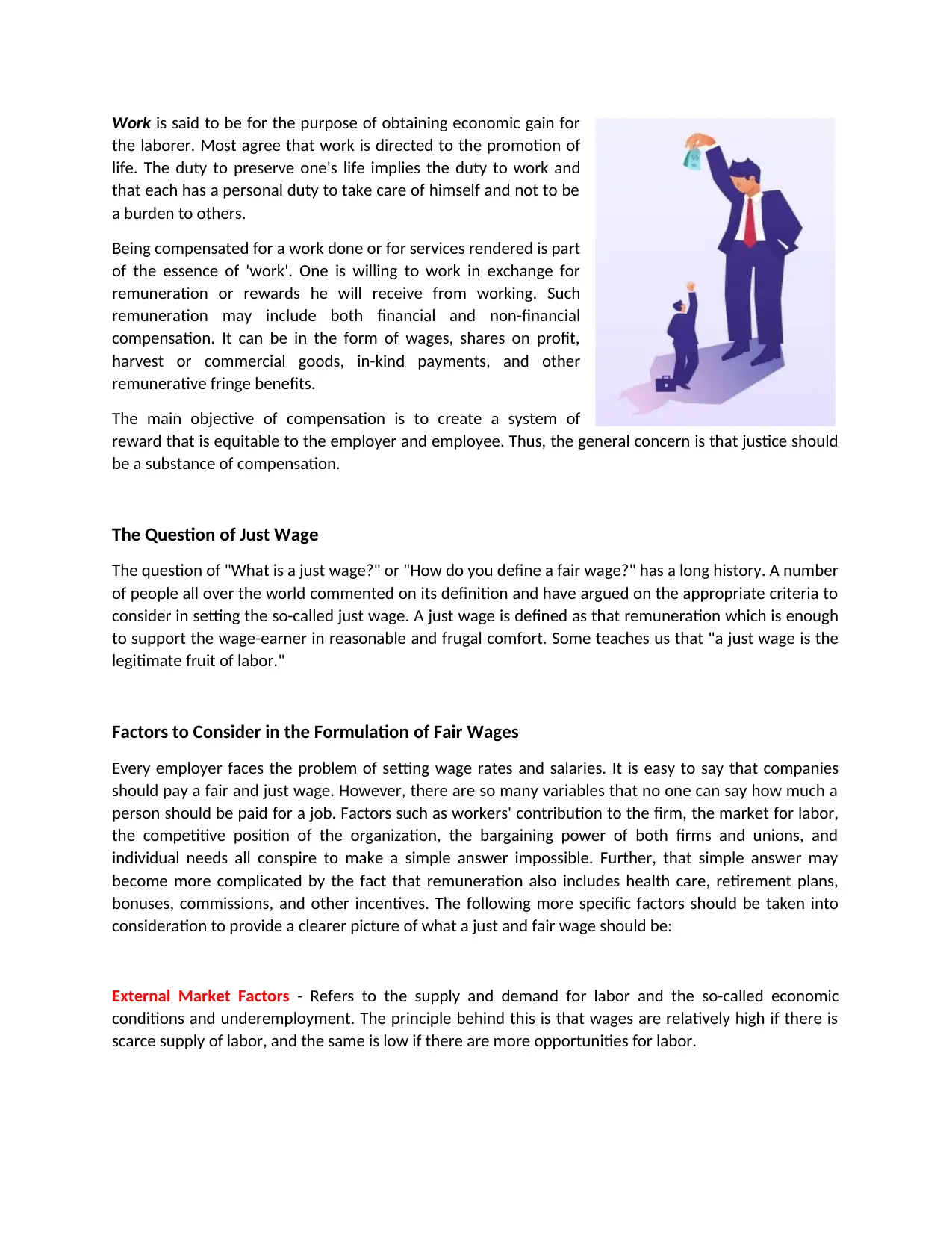
Work is said to be for the purpose of obtaining economic gain for
the laborer. Most agree that work is directed to the promotion of
life. The duty to preserve one's life implies the duty to work and
that each has a personal duty to take care of himself and not to be
a burden to others.
Being compensated for a work done or for services rendered is part
of the essence of 'work'. One is willing to work in exchange for
remuneration or rewards he will receive from working. Such
remuneration may include both financial and non-financial
compensation. It can be in the form of wages, shares on profit,
harvest or commercial goods, in-kind payments, and other
remunerative fringe benefits.
The main objective of compensation is to create a system of
reward that is equitable to the employer and employee. Thus, the general concern is that justice should
be a substance of compensation.
The Question of Just Wage
The question of "What is a just wage?" or "How do you define a fair wage?" has a long history. A number
of people all over the world commented on its definition and have argued on the appropriate criteria to
consider in setting the so-called just wage. A just wage is defined as that remuneration which is enough
to support the wage-earner in reasonable and frugal comfort. Some teaches us that "a just wage is the
legitimate fruit of labor."
Factors to Consider in the Formulation of Fair Wages
Every employer faces the problem of setting wage rates and salaries. It is easy to say that companies
should pay a fair and just wage. However, there are so many variables that no one can say how much a
person should be paid for a job. Factors such as workers' contribution to the firm, the market for labor,
the competitive position of the organization, the bargaining power of both firms and unions, and
individual needs all conspire to make a simple answer impossible. Further, that simple answer may
become more complicated by the fact that remuneration also includes health care, retirement plans,
bonuses, commissions, and other incentives. The following more specific factors should be taken into
consideration to provide a clearer picture of what a just and fair wage should be:
External Market Factors - Refers to the supply and demand for labor and the so-called economic
conditions and underemployment. The principle behind this is that wages are relatively high if there is
scarce supply of labor, and the same is low if there are more opportunities for labor.
the laborer. Most agree that work is directed to the promotion of
life. The duty to preserve one's life implies the duty to work and
that each has a personal duty to take care of himself and not to be
a burden to others.
Being compensated for a work done or for services rendered is part
of the essence of 'work'. One is willing to work in exchange for
remuneration or rewards he will receive from working. Such
remuneration may include both financial and non-financial
compensation. It can be in the form of wages, shares on profit,
harvest or commercial goods, in-kind payments, and other
remunerative fringe benefits.
The main objective of compensation is to create a system of
reward that is equitable to the employer and employee. Thus, the general concern is that justice should
be a substance of compensation.
The Question of Just Wage
The question of "What is a just wage?" or "How do you define a fair wage?" has a long history. A number
of people all over the world commented on its definition and have argued on the appropriate criteria to
consider in setting the so-called just wage. A just wage is defined as that remuneration which is enough
to support the wage-earner in reasonable and frugal comfort. Some teaches us that "a just wage is the
legitimate fruit of labor."
Factors to Consider in the Formulation of Fair Wages
Every employer faces the problem of setting wage rates and salaries. It is easy to say that companies
should pay a fair and just wage. However, there are so many variables that no one can say how much a
person should be paid for a job. Factors such as workers' contribution to the firm, the market for labor,
the competitive position of the organization, the bargaining power of both firms and unions, and
individual needs all conspire to make a simple answer impossible. Further, that simple answer may
become more complicated by the fact that remuneration also includes health care, retirement plans,
bonuses, commissions, and other incentives. The following more specific factors should be taken into
consideration to provide a clearer picture of what a just and fair wage should be:
External Market Factors - Refers to the supply and demand for labor and the so-called economic
conditions and underemployment. The principle behind this is that wages are relatively high if there is
scarce supply of labor, and the same is low if there are more opportunities for labor.
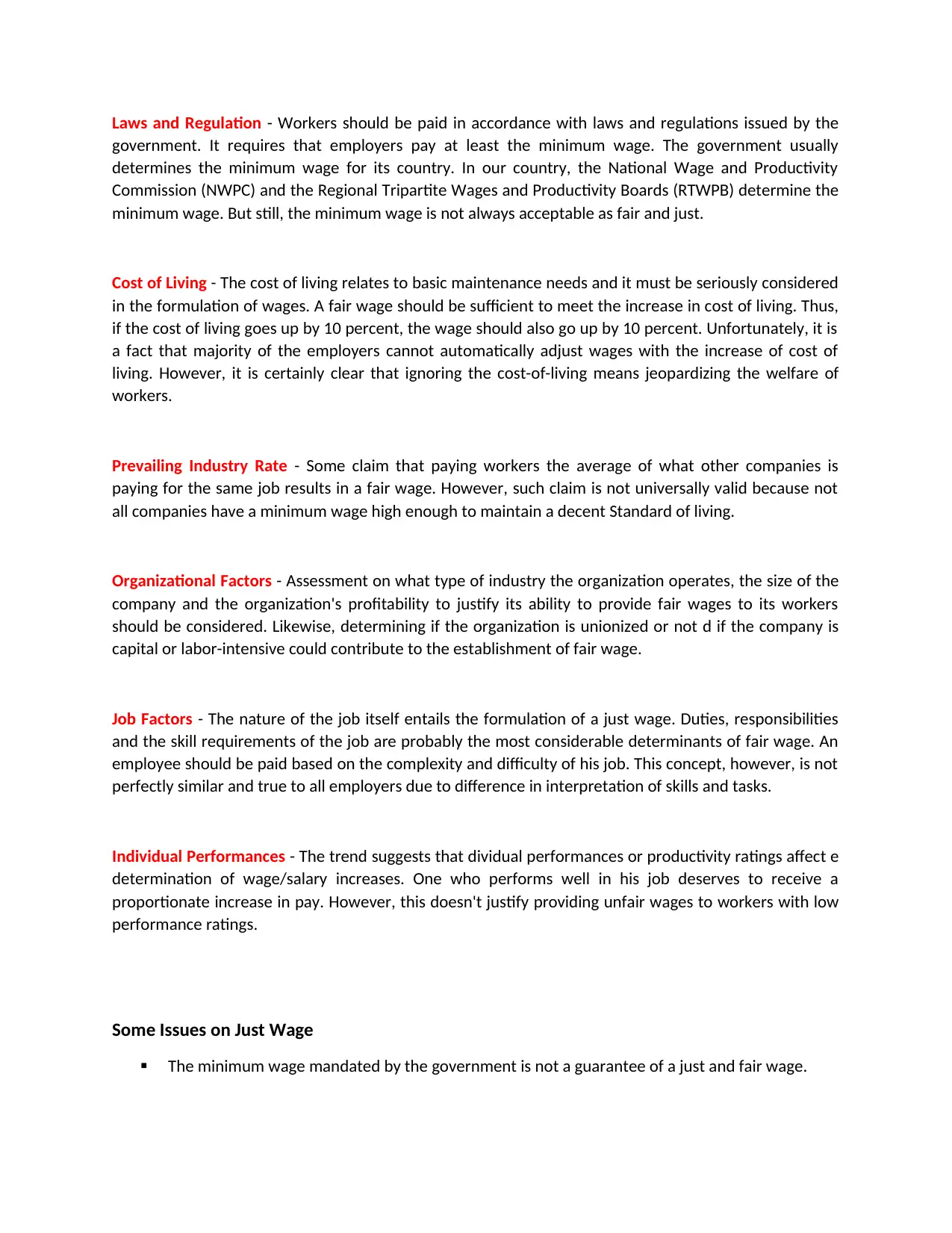
Laws and Regulation - Workers should be paid in accordance with laws and regulations issued by the
government. It requires that employers pay at least the minimum wage. The government usually
determines the minimum wage for its country. In our country, the National Wage and Productivity
Commission (NWPC) and the Regional Tripartite Wages and Productivity Boards (RTWPB) determine the
minimum wage. But still, the minimum wage is not always acceptable as fair and just.
Cost of Living - The cost of living relates to basic maintenance needs and it must be seriously considered
in the formulation of wages. A fair wage should be sufficient to meet the increase in cost of living. Thus,
if the cost of living goes up by 10 percent, the wage should also go up by 10 percent. Unfortunately, it is
a fact that majority of the employers cannot automatically adjust wages with the increase of cost of
living. However, it is certainly clear that ignoring the cost-of-living means jeopardizing the welfare of
workers.
Prevailing Industry Rate - Some claim that paying workers the average of what other companies is
paying for the same job results in a fair wage. However, such claim is not universally valid because not
all companies have a minimum wage high enough to maintain a decent Standard of living.
Organizational Factors - Assessment on what type of industry the organization operates, the size of the
company and the organization's profitability to justify its ability to provide fair wages to its workers
should be considered. Likewise, determining if the organization is unionized or not d if the company is
capital or labor-intensive could contribute to the establishment of fair wage.
Job Factors - The nature of the job itself entails the formulation of a just wage. Duties, responsibilities
and the skill requirements of the job are probably the most considerable determinants of fair wage. An
employee should be paid based on the complexity and difficulty of his job. This concept, however, is not
perfectly similar and true to all employers due to difference in interpretation of skills and tasks.
Individual Performances - The trend suggests that dividual performances or productivity ratings affect e
determination of wage/salary increases. One who performs well in his job deserves to receive a
proportionate increase in pay. However, this doesn't justify providing unfair wages to workers with low
performance ratings.
Some Issues on Just Wage
The minimum wage mandated by the government is not a guarantee of a just and fair wage.
government. It requires that employers pay at least the minimum wage. The government usually
determines the minimum wage for its country. In our country, the National Wage and Productivity
Commission (NWPC) and the Regional Tripartite Wages and Productivity Boards (RTWPB) determine the
minimum wage. But still, the minimum wage is not always acceptable as fair and just.
Cost of Living - The cost of living relates to basic maintenance needs and it must be seriously considered
in the formulation of wages. A fair wage should be sufficient to meet the increase in cost of living. Thus,
if the cost of living goes up by 10 percent, the wage should also go up by 10 percent. Unfortunately, it is
a fact that majority of the employers cannot automatically adjust wages with the increase of cost of
living. However, it is certainly clear that ignoring the cost-of-living means jeopardizing the welfare of
workers.
Prevailing Industry Rate - Some claim that paying workers the average of what other companies is
paying for the same job results in a fair wage. However, such claim is not universally valid because not
all companies have a minimum wage high enough to maintain a decent Standard of living.
Organizational Factors - Assessment on what type of industry the organization operates, the size of the
company and the organization's profitability to justify its ability to provide fair wages to its workers
should be considered. Likewise, determining if the organization is unionized or not d if the company is
capital or labor-intensive could contribute to the establishment of fair wage.
Job Factors - The nature of the job itself entails the formulation of a just wage. Duties, responsibilities
and the skill requirements of the job are probably the most considerable determinants of fair wage. An
employee should be paid based on the complexity and difficulty of his job. This concept, however, is not
perfectly similar and true to all employers due to difference in interpretation of skills and tasks.
Individual Performances - The trend suggests that dividual performances or productivity ratings affect e
determination of wage/salary increases. One who performs well in his job deserves to receive a
proportionate increase in pay. However, this doesn't justify providing unfair wages to workers with low
performance ratings.
Some Issues on Just Wage
The minimum wage mandated by the government is not a guarantee of a just and fair wage.
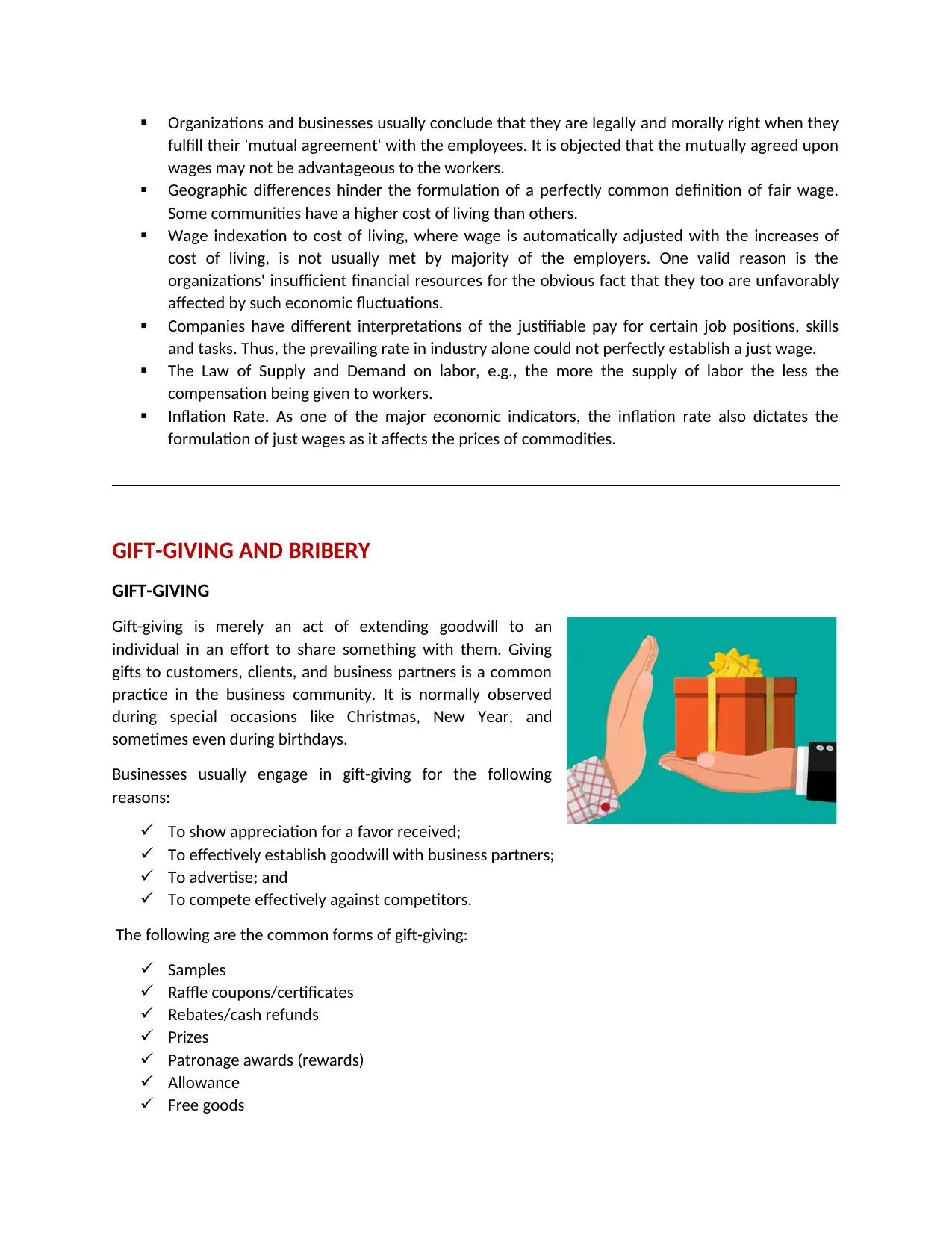
Organizations and businesses usually conclude that they are legally and morally right when they
fulfill their 'mutual agreement' with the employees. It is objected that the mutually agreed upon
wages may not be advantageous to the workers.
Geographic differences hinder the formulation of a perfectly common definition of fair wage.
Some communities have a higher cost of living than others.
Wage indexation to cost of living, where wage is automatically adjusted with the increases of
cost of living, is not usually met by majority of the employers. One valid reason is the
organizations' insufficient financial resources for the obvious fact that they too are unfavorably
affected by such economic fluctuations.
Companies have different interpretations of the justifiable pay for certain job positions, skills
and tasks. Thus, the prevailing rate in industry alone could not perfectly establish a just wage.
The Law of Supply and Demand on labor, e.g., the more the supply of labor the less the
compensation being given to workers.
Inflation Rate. As one of the major economic indicators, the inflation rate also dictates the
formulation of just wages as it affects the prices of commodities.
GIFT-GIVING AND BRIBERY
GIFT-GIVING
Gift-giving is merely an act of extending goodwill to an
individual in an effort to share something with them. Giving
gifts to customers, clients, and business partners is a common
practice in the business community. It is normally observed
during special occasions like Christmas, New Year, and
sometimes even during birthdays.
Businesses usually engage in gift-giving for the following
reasons:
To show appreciation for a favor received;
To effectively establish goodwill with business partners;
To advertise; and
To compete effectively against competitors.
The following are the common forms of gift-giving:
Samples
Raffle coupons/certificates
Rebates/cash refunds
Prizes
Patronage awards (rewards)
Allowance
Free goods
fulfill their 'mutual agreement' with the employees. It is objected that the mutually agreed upon
wages may not be advantageous to the workers.
Geographic differences hinder the formulation of a perfectly common definition of fair wage.
Some communities have a higher cost of living than others.
Wage indexation to cost of living, where wage is automatically adjusted with the increases of
cost of living, is not usually met by majority of the employers. One valid reason is the
organizations' insufficient financial resources for the obvious fact that they too are unfavorably
affected by such economic fluctuations.
Companies have different interpretations of the justifiable pay for certain job positions, skills
and tasks. Thus, the prevailing rate in industry alone could not perfectly establish a just wage.
The Law of Supply and Demand on labor, e.g., the more the supply of labor the less the
compensation being given to workers.
Inflation Rate. As one of the major economic indicators, the inflation rate also dictates the
formulation of just wages as it affects the prices of commodities.
GIFT-GIVING AND BRIBERY
GIFT-GIVING
Gift-giving is merely an act of extending goodwill to an
individual in an effort to share something with them. Giving
gifts to customers, clients, and business partners is a common
practice in the business community. It is normally observed
during special occasions like Christmas, New Year, and
sometimes even during birthdays.
Businesses usually engage in gift-giving for the following
reasons:
To show appreciation for a favor received;
To effectively establish goodwill with business partners;
To advertise; and
To compete effectively against competitors.
The following are the common forms of gift-giving:
Samples
Raffle coupons/certificates
Rebates/cash refunds
Prizes
Patronage awards (rewards)
Allowance
Free goods
Paraphrase This Document
Need a fresh take? Get an instant paraphrase of this document with our AI Paraphraser
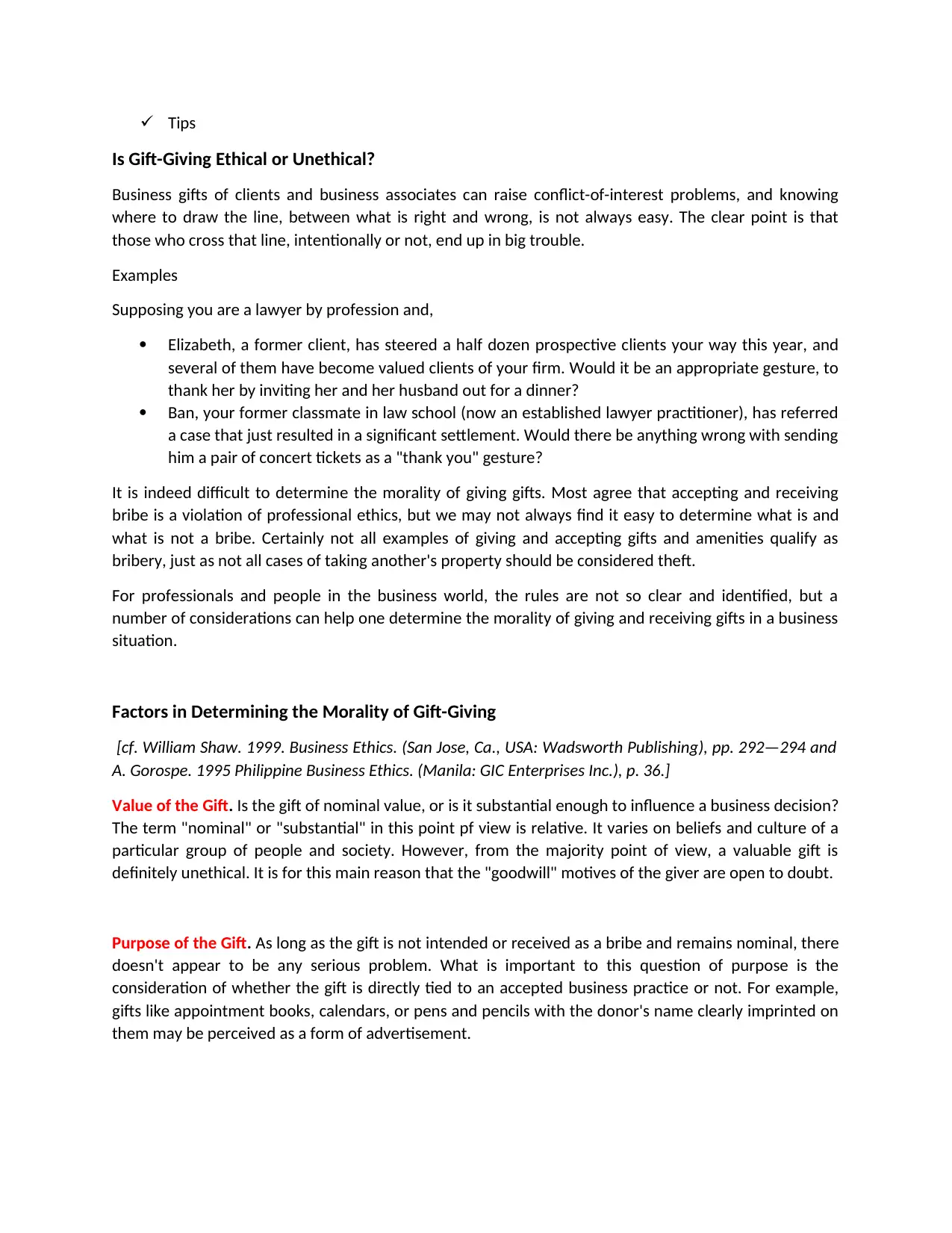
Tips
Is Gift-Giving Ethical or Unethical?
Business gifts of clients and business associates can raise conflict-of-interest problems, and knowing
where to draw the line, between what is right and wrong, is not always easy. The clear point is that
those who cross that line, intentionally or not, end up in big trouble.
Examples
Supposing you are a lawyer by profession and,
Elizabeth, a former client, has steered a half dozen prospective clients your way this year, and
several of them have become valued clients of your firm. Would it be an appropriate gesture, to
thank her by inviting her and her husband out for a dinner?
Ban, your former classmate in law school (now an established lawyer practitioner), has referred
a case that just resulted in a significant settlement. Would there be anything wrong with sending
him a pair of concert tickets as a "thank you" gesture?
It is indeed difficult to determine the morality of giving gifts. Most agree that accepting and receiving
bribe is a violation of professional ethics, but we may not always find it easy to determine what is and
what is not a bribe. Certainly not all examples of giving and accepting gifts and amenities qualify as
bribery, just as not all cases of taking another's property should be considered theft.
For professionals and people in the business world, the rules are not so clear and identified, but a
number of considerations can help one determine the morality of giving and receiving gifts in a business
situation.
Factors in Determining the Morality of Gift-Giving
[cf. William Shaw. 1999. Business Ethics. (San Jose, Ca., USA: Wadsworth Publishing), pp. 292—294 and
A. Gorospe. 1995 Philippine Business Ethics. (Manila: GIC Enterprises Inc.), p. 36.]
Value of the Gift. Is the gift of nominal value, or is it substantial enough to influence a business decision?
The term "nominal" or "substantial" in this point pf view is relative. It varies on beliefs and culture of a
particular group of people and society. However, from the majority point of view, a valuable gift is
definitely unethical. It is for this main reason that the "goodwill" motives of the giver are open to doubt.
Purpose of the Gift. As long as the gift is not intended or received as a bribe and remains nominal, there
doesn't appear to be any serious problem. What is important to this question of purpose is the
consideration of whether the gift is directly tied to an accepted business practice or not. For example,
gifts like appointment books, calendars, or pens and pencils with the donor's name clearly imprinted on
them may be perceived as a form of advertisement.
Is Gift-Giving Ethical or Unethical?
Business gifts of clients and business associates can raise conflict-of-interest problems, and knowing
where to draw the line, between what is right and wrong, is not always easy. The clear point is that
those who cross that line, intentionally or not, end up in big trouble.
Examples
Supposing you are a lawyer by profession and,
Elizabeth, a former client, has steered a half dozen prospective clients your way this year, and
several of them have become valued clients of your firm. Would it be an appropriate gesture, to
thank her by inviting her and her husband out for a dinner?
Ban, your former classmate in law school (now an established lawyer practitioner), has referred
a case that just resulted in a significant settlement. Would there be anything wrong with sending
him a pair of concert tickets as a "thank you" gesture?
It is indeed difficult to determine the morality of giving gifts. Most agree that accepting and receiving
bribe is a violation of professional ethics, but we may not always find it easy to determine what is and
what is not a bribe. Certainly not all examples of giving and accepting gifts and amenities qualify as
bribery, just as not all cases of taking another's property should be considered theft.
For professionals and people in the business world, the rules are not so clear and identified, but a
number of considerations can help one determine the morality of giving and receiving gifts in a business
situation.
Factors in Determining the Morality of Gift-Giving
[cf. William Shaw. 1999. Business Ethics. (San Jose, Ca., USA: Wadsworth Publishing), pp. 292—294 and
A. Gorospe. 1995 Philippine Business Ethics. (Manila: GIC Enterprises Inc.), p. 36.]
Value of the Gift. Is the gift of nominal value, or is it substantial enough to influence a business decision?
The term "nominal" or "substantial" in this point pf view is relative. It varies on beliefs and culture of a
particular group of people and society. However, from the majority point of view, a valuable gift is
definitely unethical. It is for this main reason that the "goodwill" motives of the giver are open to doubt.
Purpose of the Gift. As long as the gift is not intended or received as a bribe and remains nominal, there
doesn't appear to be any serious problem. What is important to this question of purpose is the
consideration of whether the gift is directly tied to an accepted business practice or not. For example,
gifts like appointment books, calendars, or pens and pencils with the donor's name clearly imprinted on
them may be perceived as a form of advertisement.
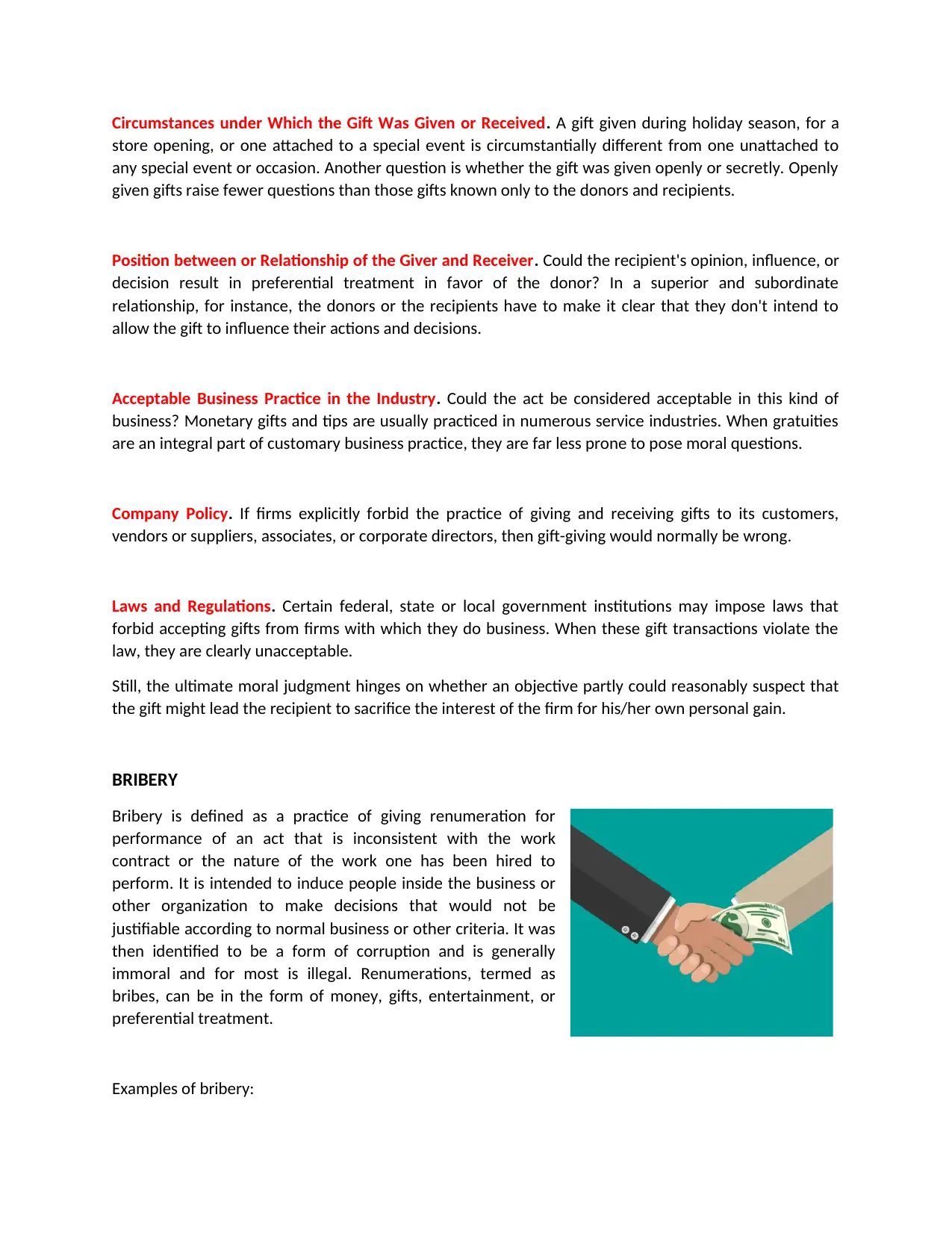
Circumstances under Which the Gift Was Given or Received. A gift given during holiday season, for a
store opening, or one attached to a special event is circumstantially different from one unattached to
any special event or occasion. Another question is whether the gift was given openly or secretly. Openly
given gifts raise fewer questions than those gifts known only to the donors and recipients.
Position between or Relationship of the Giver and Receiver. Could the recipient's opinion, influence, or
decision result in preferential treatment in favor of the donor? In a superior and subordinate
relationship, for instance, the donors or the recipients have to make it clear that they don't intend to
allow the gift to influence their actions and decisions.
Acceptable Business Practice in the Industry. Could the act be considered acceptable in this kind of
business? Monetary gifts and tips are usually practiced in numerous service industries. When gratuities
are an integral part of customary business practice, they are far less prone to pose moral questions.
Company Policy. If firms explicitly forbid the practice of giving and receiving gifts to its customers,
vendors or suppliers, associates, or corporate directors, then gift-giving would normally be wrong.
Laws and Regulations. Certain federal, state or local government institutions may impose laws that
forbid accepting gifts from firms with which they do business. When these gift transactions violate the
law, they are clearly unacceptable.
Still, the ultimate moral judgment hinges on whether an objective partly could reasonably suspect that
the gift might lead the recipient to sacrifice the interest of the firm for his/her own personal gain.
BRIBERY
Bribery is defined as a practice of giving renumeration for
performance of an act that is inconsistent with the work
contract or the nature of the work one has been hired to
perform. It is intended to induce people inside the business or
other organization to make decisions that would not be
justifiable according to normal business or other criteria. It was
then identified to be a form of corruption and is generally
immoral and for most is illegal. Renumerations, termed as
bribes, can be in the form of money, gifts, entertainment, or
preferential treatment.
Examples of bribery:
store opening, or one attached to a special event is circumstantially different from one unattached to
any special event or occasion. Another question is whether the gift was given openly or secretly. Openly
given gifts raise fewer questions than those gifts known only to the donors and recipients.
Position between or Relationship of the Giver and Receiver. Could the recipient's opinion, influence, or
decision result in preferential treatment in favor of the donor? In a superior and subordinate
relationship, for instance, the donors or the recipients have to make it clear that they don't intend to
allow the gift to influence their actions and decisions.
Acceptable Business Practice in the Industry. Could the act be considered acceptable in this kind of
business? Monetary gifts and tips are usually practiced in numerous service industries. When gratuities
are an integral part of customary business practice, they are far less prone to pose moral questions.
Company Policy. If firms explicitly forbid the practice of giving and receiving gifts to its customers,
vendors or suppliers, associates, or corporate directors, then gift-giving would normally be wrong.
Laws and Regulations. Certain federal, state or local government institutions may impose laws that
forbid accepting gifts from firms with which they do business. When these gift transactions violate the
law, they are clearly unacceptable.
Still, the ultimate moral judgment hinges on whether an objective partly could reasonably suspect that
the gift might lead the recipient to sacrifice the interest of the firm for his/her own personal gain.
BRIBERY
Bribery is defined as a practice of giving renumeration for
performance of an act that is inconsistent with the work
contract or the nature of the work one has been hired to
perform. It is intended to induce people inside the business or
other organization to make decisions that would not be
justifiable according to normal business or other criteria. It was
then identified to be a form of corruption and is generally
immoral and for most is illegal. Renumerations, termed as
bribes, can be in the form of money, gifts, entertainment, or
preferential treatment.
Examples of bribery:
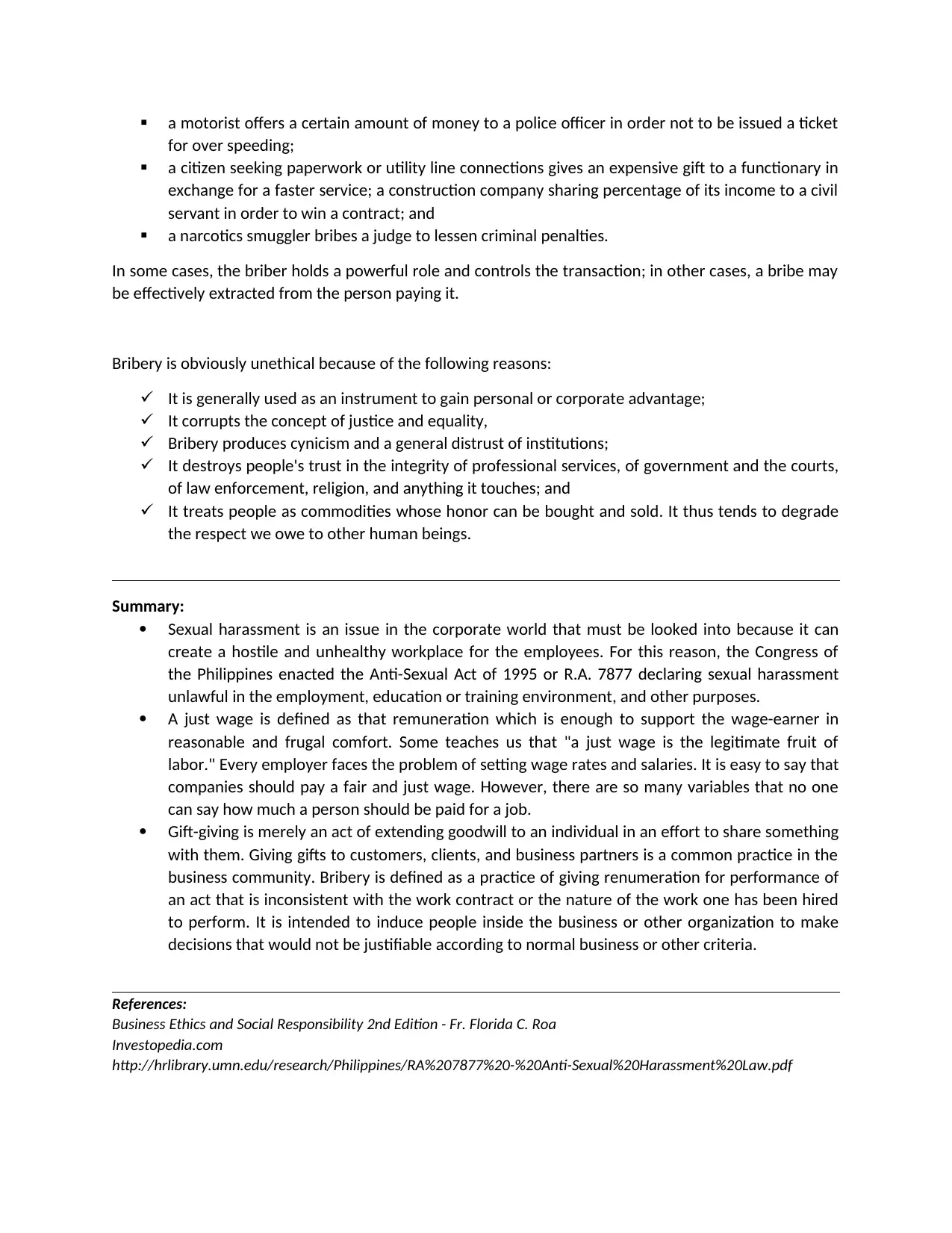
a motorist offers a certain amount of money to a police officer in order not to be issued a ticket
for over speeding;
a citizen seeking paperwork or utility line connections gives an expensive gift to a functionary in
exchange for a faster service; a construction company sharing percentage of its income to a civil
servant in order to win a contract; and
a narcotics smuggler bribes a judge to lessen criminal penalties.
In some cases, the briber holds a powerful role and controls the transaction; in other cases, a bribe may
be effectively extracted from the person paying it.
Bribery is obviously unethical because of the following reasons:
It is generally used as an instrument to gain personal or corporate advantage;
It corrupts the concept of justice and equality,
Bribery produces cynicism and a general distrust of institutions;
It destroys people's trust in the integrity of professional services, of government and the courts,
of law enforcement, religion, and anything it touches; and
It treats people as commodities whose honor can be bought and sold. It thus tends to degrade
the respect we owe to other human beings.
Summary:
Sexual harassment is an issue in the corporate world that must be looked into because it can
create a hostile and unhealthy workplace for the employees. For this reason, the Congress of
the Philippines enacted the Anti-Sexual Act of 1995 or R.A. 7877 declaring sexual harassment
unlawful in the employment, education or training environment, and other purposes.
A just wage is defined as that remuneration which is enough to support the wage-earner in
reasonable and frugal comfort. Some teaches us that "a just wage is the legitimate fruit of
labor." Every employer faces the problem of setting wage rates and salaries. It is easy to say that
companies should pay a fair and just wage. However, there are so many variables that no one
can say how much a person should be paid for a job.
Gift-giving is merely an act of extending goodwill to an individual in an effort to share something
with them. Giving gifts to customers, clients, and business partners is a common practice in the
business community. Bribery is defined as a practice of giving renumeration for performance of
an act that is inconsistent with the work contract or the nature of the work one has been hired
to perform. It is intended to induce people inside the business or other organization to make
decisions that would not be justifiable according to normal business or other criteria.
References:
Business Ethics and Social Responsibility 2nd Edition - Fr. Florida C. Roa
Investopedia.com
http://hrlibrary.umn.edu/research/Philippines/RA%207877%20-%20Anti-Sexual%20Harassment%20Law.pdf
for over speeding;
a citizen seeking paperwork or utility line connections gives an expensive gift to a functionary in
exchange for a faster service; a construction company sharing percentage of its income to a civil
servant in order to win a contract; and
a narcotics smuggler bribes a judge to lessen criminal penalties.
In some cases, the briber holds a powerful role and controls the transaction; in other cases, a bribe may
be effectively extracted from the person paying it.
Bribery is obviously unethical because of the following reasons:
It is generally used as an instrument to gain personal or corporate advantage;
It corrupts the concept of justice and equality,
Bribery produces cynicism and a general distrust of institutions;
It destroys people's trust in the integrity of professional services, of government and the courts,
of law enforcement, religion, and anything it touches; and
It treats people as commodities whose honor can be bought and sold. It thus tends to degrade
the respect we owe to other human beings.
Summary:
Sexual harassment is an issue in the corporate world that must be looked into because it can
create a hostile and unhealthy workplace for the employees. For this reason, the Congress of
the Philippines enacted the Anti-Sexual Act of 1995 or R.A. 7877 declaring sexual harassment
unlawful in the employment, education or training environment, and other purposes.
A just wage is defined as that remuneration which is enough to support the wage-earner in
reasonable and frugal comfort. Some teaches us that "a just wage is the legitimate fruit of
labor." Every employer faces the problem of setting wage rates and salaries. It is easy to say that
companies should pay a fair and just wage. However, there are so many variables that no one
can say how much a person should be paid for a job.
Gift-giving is merely an act of extending goodwill to an individual in an effort to share something
with them. Giving gifts to customers, clients, and business partners is a common practice in the
business community. Bribery is defined as a practice of giving renumeration for performance of
an act that is inconsistent with the work contract or the nature of the work one has been hired
to perform. It is intended to induce people inside the business or other organization to make
decisions that would not be justifiable according to normal business or other criteria.
References:
Business Ethics and Social Responsibility 2nd Edition - Fr. Florida C. Roa
Investopedia.com
http://hrlibrary.umn.edu/research/Philippines/RA%207877%20-%20Anti-Sexual%20Harassment%20Law.pdf
1 out of 10
Related Documents
Your All-in-One AI-Powered Toolkit for Academic Success.
+13062052269
info@desklib.com
Available 24*7 on WhatsApp / Email
![[object Object]](/_next/static/media/star-bottom.7253800d.svg)
Unlock your academic potential
© 2024 | Zucol Services PVT LTD | All rights reserved.




